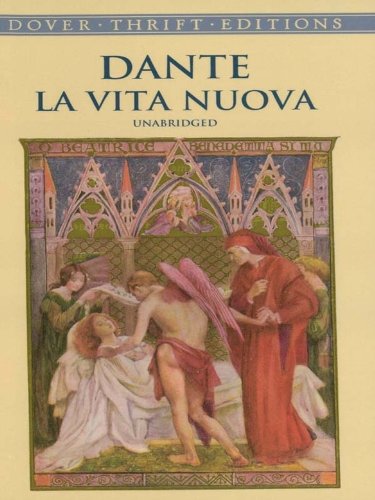Dante Alighieri is widely considered one of the greatest poets of all time, and for good reason. His most famous work, The Divine Comedy, is still greatly influential today despite being released around 650 years ago. It’s notoriety and long-lasting impact can be attributed to the way Dante’s work revolutionized literature in his time, popularizing certain styles of poetry and inspiring many great authors to write in their native tongue.
One of Dante’s many accomplishments includes helping to popularize the sonnet. The Sicilian School was a renowned group of poets from Sicily, Tuscany, and southern Italy that gathered in the court of Emperor Frederick II, and they came together to invent the poetic style known as the sonnet (The Editors of Encyclopaedia Britannica, Sicilian school). Dante was greatly inspired by this group of poets, and eventually began writing sonnets of his own. At the age of 18, Dante published La Vita Nuova, which was 42 chapters long and included 25 sonnets centered around his love for Beatrice (Quinones, Legacy and influence of Dante). La Vita Nuova also included themes of “courtly love” (Amazon Affiliate Program, How did Dante influence the Renaissance 2021), which later spread all throughout Europe during the Renaissance. Dante also invented his own style of poetry, known as terza rima, which follows the pattern of the second line of a stanza rhyming with the first and third line of the next stanza (a pattern of ABA, BCB, CDC, etc) (Academy of American Poets, Terza Rima). An example of the terza rima style is shown in Dante’s very first canto of Inferno, which features the lines “Tant’ è amara che poco è più morte; ma per trattar del ben ch’i’ vi trovai, dirò de l’altre cose ch’i’ v’ho scorte. Io non so ben ridir com’ i’ v’intrai, tant’ era pien di sonno a quel punto che la verace via abbandonai. Ma poi ch’i’ fui al piè d’un colle giunto, là dove terminava quella valle che m’avea di paura il cor compunto,” (Alighieri, Canto 1, lines 7-15). This style inspired many poets; ranging from famous Italian poets such as Boccaccio and Petrarch, and spreading outside of Italy to the rest of Europe after being brought to England by Geoffrey Chaucer in the 14th-century with the poem “Complaints to his Lady” (Academy of American Poets, Terza Rima).

Unsurprisingly, Dante also inspired many authors to start writing in their native language. During the Middle Ages (500-1500 CE), literature and philosophical works were typically only written in Latin, which made these works inaccessible to the general public. However, Dante believed that one’s own vernacular was suitable enough to use in these genres, which was a radical idea at the time. Dante later wrote The Divine Comedy in his Tuscan dialect, but also borrowed from other Italian dialects and even from Latin itself (Amazon Affiliate Program, How did Dante influence the Renaissance 2021) . Due to the success of The Divine Comedy, Tuscan became the standard language for works of literature and many Renaissance writers began to write in their own unique dialect.
- Amazon Affiliate Program. (2021, September 21). How did Dante influence the Renaissance. How did Dante influence the Renaissance – DailyHistory.org. Retrieved October 2, 2021, from https://dailyhistory.org/How_did_Dante_influence_the_Renaissance.
- Baldwin, E., (2020, October 15). Terza Rima. Poem Analysis. Retrieved from https://poemanalysis.com/poetic-form/terza-rima/
- Academy of American Poets. (n.d.). Terza Rima. Poets.org. Retrieved October 2, 2021, from https://poets.org/glossary/terza-rima.
- Quinones, R. J. (n.d.). Legacy and influence of Dante. Encyclopædia Britannica. Retrieved October 2, 2021, from https://www.britannica.com/biography/Dante-Alighieri/Legacy-and-influence.
- Encyclopædia Britannica, inc. (n.d.). Sicilian school. Encyclopædia Britannica. Retrieved October 2, 2021, from https://www.britannica.com/art/Sicilian-school.
- Blauvelt, C. (2018, June 5). Dante and the divine comedy: He took us on a tour of hell. BBC Culture. Retrieved October 2, 2021, from https://www.bbc.com/culture/article/20180604-dante-and-the-divine-comedy-he-took-us-on-a-tour-of-hell.


